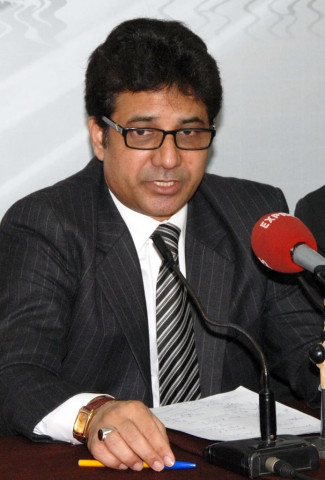Child abuse: ‘Prevention better than punishment’
Workshop reviews UNCRC recommendations to Pakistan

Sindhu pledged that he would personally facilitate the NGOs and civil society. PHOTO: SHAHBAZ MALIK
He was chairing a workshop on the concluding observations of the 5th periodic report of Pakistan to the United Nations Convention on the Rights of the Child (UNCRC).
Earlier, Maher Safdar Ali of the Bonded Labour Liberation Front, said, “New legislation cannot be effective if there is no enforcement mechanism.”
Citing the law forbidding child labour at brick kilns, he said it had not been fully enforced as a mechanism was lacking.
He said, “The civil society can only point out problems and advocate change. It is the responsibility of the government to address the problems.”
He said a national monitoring body should be set up to oversee where human rights conventions were being violated.
Some activists at the workshop expressed dismay over the fact that the number of recommendations made to Pakistan over the years had not changed. They said that children were among the vulnerable groups in society. They said it was distressing to see that the government had ignored scores of UN recommendations on children including death penalty, adolescent mental health, education and economic exploitation.
Minister for Human Rights Khalil Tahir Sindhu said, “I concede that the government sometimes wrongfully interferes in civil society activities. I will convey this concern to the cabinet.” The minister also asked for a comprehensive set of recommendations so that he could assess the amount of unfinished work.
Recent child kidnappings reported in Lahore were also discussed at the workshop.
A DSP told the participants that police was doing their best under the circumstances given the limited resources. “On the orders issued by the inspector general, all tiers of the Police Department are working to recover the missing children.” The DSP said shortage of resources had prevented police from forming a permanenr cell to monitor child abuse cases.
Addressing the police officers, Atif Adnan, director of legal affairs at the CAN, said even if new cells and officers were not available, some officers could be provided investigative and sensitivity training to deal with offences against women and children.
After furthering reviewing the UN committee’s recommendations, participants of the workshop called for more mental health professionals to be appointed in government hospitals and schools, so that the rising suicide rate among children could be curbed.
They also called for rehabilitative set-ups for children.
Sindhu pledged that he would personally facilitate the NGOs and civil society. He said the government was working on removing hate material from textbooks. He said human rights task forces had been formed by the government and would be made functional soon.
Published in The Express Tribune, August 5th, 2016.


















COMMENTS
Comments are moderated and generally will be posted if they are on-topic and not abusive.
For more information, please see our Comments FAQ